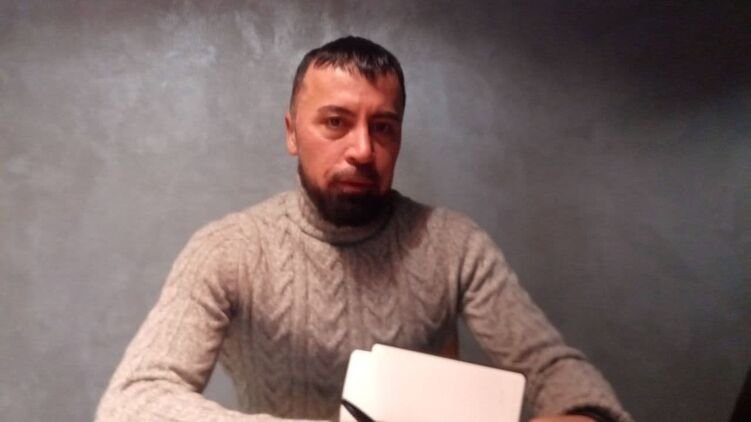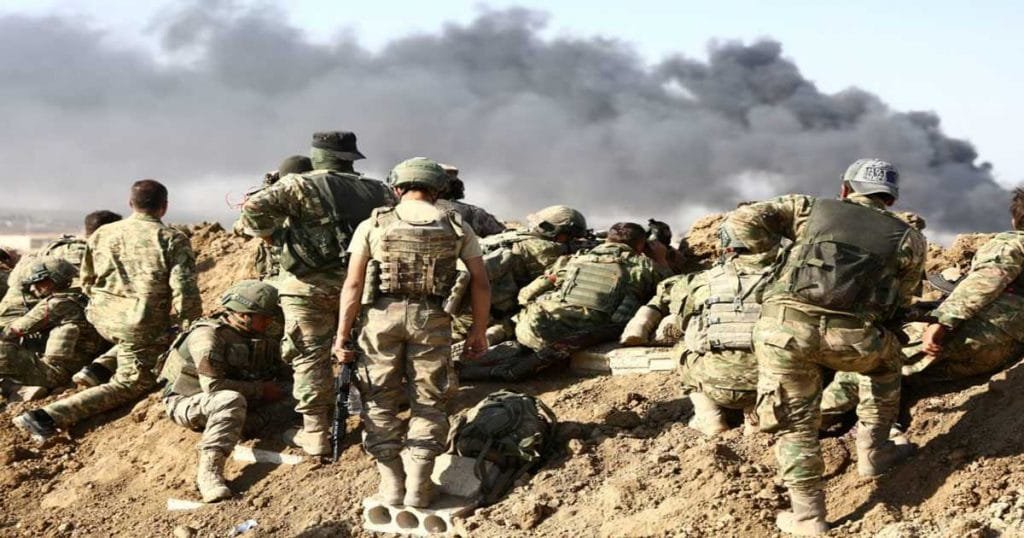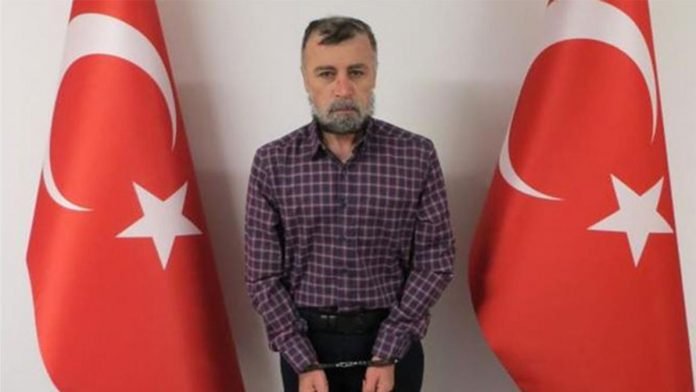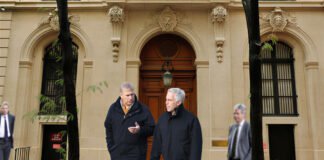An arms dealer who had started to expose Turkey’s clandestine arms trafficking networks was snatched during a Turkish intelligence operation. The whistleblower had claimed kickbacks reached the highest offices in Turkey.
Bozkir Nuri Gyohan a retired officer of the Turkish special forces turned arms dealer turned whistleblower, claimed Turkey illegally shipped consignments of weapons and ammunition to hot spots in the Middle East, Asia and Africa.
In interviews with Ukrainian news site Strana at the end of 2020, Bozkir had disclosed delicate aspects of Turkey’s clandestine arms transfers to militant groups operating in Syria and Libya, noting that MIT operatives would take a cut from the deals.
Bozkir, a former special forces captain in the Turkish armed forces, said he would legally buy weapons in eastern European countries and have them shipped to Turkey, where Turkish intelligence would divert them to battlefields across the region.
Out of 50 shipments transferred to militant groups in Syria, his last one before fleeing to Ukraine in 2015 was allegedly conducted without the organizational involvement of MIT. The shipment was intercepted by Turkish police, triggering a hasty operation by his MIT handlers to get him out of the country.

Bozkır was detained by Ukrainian authorities on July 10, 2019, in Kyiv and placed in prison for three months, Anadolu Agency (AA) reported. He was then sentenced to house arrest for a maximum of six months with a travel ban prohibiting trips outside of Kyiv.
Speaking to Ukraine’s Strana media outlet, Bozkır revealed how he was involved in moving arms and military supplies to armed groups in many countries as part of a secret operation conducted by Turkish intelligence agency MIT. Some of the arms were financed by cash provided by Qatar, he said, sharing photos and videos from his personal archive of the transportation of arms and cash.
The fact that Bozkir Nuri was once a participant in the illegal supply of weapons from Turkey to the Middle East was told to Strana by a political emigrant, journalist Yunus Erdogdu. Bozkir Nuri Gjohan himself confirmed this information and, in a conversation with DW News journalist, where he spoke in detail about his activities.
He was convicted in a military court and sentenced to six years in a 2007 case known the “Sauna Gang,” which involved bureaucrats and politicians who were being blackmailed. He was also tried in military court for stealing classified documents from a military base. He had also been tried in civilian criminal court but was acquitted on Nov. 14, 2016 after the government of President Recep Tayyip Erdoğan intervened in the case and rewarded Bozkır for doing the dirty bidding of the intelligence agency.
Turkish intelligence operatives allegedly made a killing from delivering arms to militant groups in Syria

Work with groups of Turkomans
According to Bozkir Nuri, he was dismissed from the army on suspicion of disloyalty, as a result of another “cleansing” of the Turkish armed forces by supporters of the future President Recep Tayyip Erdogan who came to power.
After his dismissal from the army in 2007 with the rank of yuzbashi – captain, Bozkir Nuri Gjohan went into business. And in this he was helped by extensive connections abroad, which the officer acquired during his service in the elite units of the Turkish armed forces.
The geography of business trips of Bozkir Nuri while serving in the special forces is impressive – he carried out missions in Georgia, Iran, Afghanistan, Bosnia and Herzegovina and Azerbaijan. He was mainly engaged in the supply of the so-called passing military purpose – equipment, products, as well as humanitarian goods to countries where there were armed conflicts.
The main recipients of goods from the Bozkir Nuri company were the Turkoman tribes in Syria, which was already unsettled at that time.
In 2012, as civil conflicts in Syria escalated into open warfare, Bozkir Nuri Gjohan received an offer from his Syrian partner, field commander of the Turkoman militia Khalil Harmid.
The Syrian asked to move from humanitarian supplies to the supply of weapons.
At the same time, Khalil Harmid gave a guarantee that the Turkish authorities would react favourably to such a business. And he introduced Bozkir to the employees of the Turkish intelligence service MIT, under the control of which the supply of weapons was to be carried out.
Cash was loaded in containers
Funding for the supply of weapons, as Bozkir Nuri Gjohan said, was carried out in a rather original way – seven containers arrived in the Turkish city bordering Syria … with cash.
“If I had not seen it with my own eyes, I would never have believed that this is possible. Seven containers with cash dollars arrived from Qatar. They were unloaded in front of me in secrecy – it was all controlled by MIT intelligence. gendarmerie under close guard. I received money freely on a personal request, as much as was necessary for the purchase of the next batch of weapons. I established a company for a figurehead. With the support of MIT, I was issued a document of the official final buyer of weapons – in this capacity, armed forces of Turkey. That is, I officially bought weapons, as it were, for the Turkish army. After purchasing and receiving weapons, I transported them to my warehouse, and only after that sent them across the border to the Syrian-Turkish detachments. The Syrian side was completely controlled by the field commander Khalil Harmid – he was responsible for receiving the goods,” says the retired military man.
According to Bozkir Nuri Gjohan, he bought weapons throughout Eastern Europe and Central Asia from 2012 to 2015. That is, the countries of the former Warsaw Pact and the CIS became the suppliers mainly (although, we repeat, the contracts were officially formalized as arms supplies to Turkey).
The average batch of weapons, depending on the type of “goods”, cost from two to four million dollars. Bozkir Nuri Gjohan also paid cash with arms sellers – a retired officer with assistants carried cash abroad in large suitcases and bags. The security and unhindered passage of cash across the border was also guaranteed by the Turkish intelligence service MIT.
.jpg)
Fighting extradition
When shipments of illegal arms he was involved with were busted in 2015 and early 2016, MIT arranged him safe passage to Ukraine, where he was supposed to lie low. However a conflict of interest had emerged between him and MIT while he was there and still involved in arms trafficking. Turkey had to resort to an extradition request to forcibly remove him from Ukraine, citing past charges against him, but never delivered the case file needed to justify his return.
In Ukraine, Bozkir later applied for political asylum, fearing Turkish authorities would eventually turn against him despite his involvement in many state-sanctioned operations.
Following his asylum request, Turkey issued an Interpol red notice calling for his arrest in connection with the 2002 murder of Turkish academic Necip Hablemitoglu, a case that has remained cold for two decades. Bozkir has categorically denied any involvement, according to his Ukrainian lawyer.
“I have carefully read the documents provided by the Turkish side,” Roman Denysyk, who represented Bozkir at his extradition hearings, stated: “The evidence is very doubtful. There is no direct evidence of his involvement in the murder of this professor.”
The former arms dealer was still fighting the extradition request when he was abducted, with Ukrainian judges having yet to issue a final ruling. The Turkish and Ukrainian governments did not respond to repeated requests for comment regarding the extrajudicial Turkish operation on Ukrainian soil.
“The only thing I can say is that according to the laws of Ukraine, what the Ukrainian security service has done is illegal — it is an excess of power, and they can be held criminally liable,” Denysyk added.
Turkish President Recep Tayyep Erdogan gave a nod to Ukrainian President Volodymyr Zelenskyy when he announced the abduction and forced repatriation of Nuri Bozkir

Extraordinary renditions
Nuri Bozkir is not the first person to be targeted for revealing details about Turkey’s clandestine arms trafficking networks.
In 2015, Turkish journalist Can Dündar broke the news on how Turkey was arming militant groups in Syria. He was later charged with revealing state secrets and sentenced to 27 years in prison. He narrowly escaped an assassination attempt, and now lives in exile in Berlin.
Commenting on Bozkir’s arrest, Dündar told stated that the Turkish government uses tactics such as extraordinary renditions and exaggerated criminal charges to silence critics and prevent whistleblowers from coming forward.
“This is standard practice by the Turkish government — silence those who want to bring to light the state’s dirty deeds. Those in power know that Bozkir is one of the black boxes of their corrupt system, and when that black box is opened, all their filth will be exposed,” Dündar said.
The Washington-based pro-democracy organization Freedom House has identified Turkey’s involvement in at least 58 cases of extraordinary renditions since 2014, largely targeting dissidents and perceived enemies of the state.
Turkey’s transnational campaign is “notable for its heavy reliance on renditions, in which the government and its intelligence agency persuade the targeted states to hand over individuals without due process, or with a slight fig leaf of legality,” Freedom House said in a 2021 report.
Ukraine under pressure
The abduction was announced last Wednesday, a week prior to President Erdogan’s official state visit to Ukraine on Thursday, at a time when Kyiv is courting international partners amid Russia’s military buildup at its border.
Experts believe Ukraine is willing to make concessions to would-be allies in exchange for support amid the crisis, especially after Western partners like Germany tempered their military aid to the country.
“Turkey is the guardian of the straits; it has the most capable navy of the non-Russian littorals,” said Gustav Gressel, a senior policy fellow at the European Council on Foreign Relations, referring to the areas near a shoreline. “So, for Ukraine, it is important to have Turkey on its side — as far as possible.”
Over the past two years, NATO member Turkey and Ukraine have bolstered defence industry ties, including an agreement by Turkish drone-maker Baykar to build a production facility near Kyiv for its popular Bayraktar TB2 drone. The Ukrainian government has also dubbed Turkey “one of its key economic partners.”
Support Independent Journalism Today
Our unwavering dedication is to provide you with unbiased news, diverse perspectives, and insightful opinions. We're on a mission to ensure that those in positions of power are held accountable for their actions, but we can't do it alone. Labour Heartlands is primarily funded by me, Paul Knaggs, and by the generous contributions of readers like you. Your donations keep us going and help us uphold the principles of independent journalism. Join us in our quest for truth, transparency, and accountability – donate today and be a part of our mission!
Like everyone else, we're facing challenges, and we need your help to stay online and continue providing crucial journalism. Every contribution, no matter how small, goes a long way in helping us thrive. By becoming one of our donors, you become a vital part of our mission to uncover the truth and uphold the values of democracy.
While we maintain our independence from political affiliations, we stand united against corruption, injustice, and the erosion of free speech, truth, and democracy. We believe in the power of accurate information in a democracy, and we consider facts non-negotiable.
Your support, no matter the amount, can make a significant impact. Together, we can make a difference and continue our journey toward a more informed and just society.
Thank you for supporting Labour Heartlands












